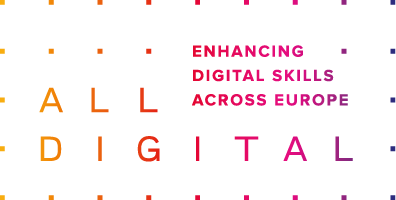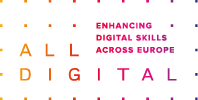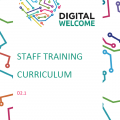
10 Jun Digital Welcome Project Final Event: digital skills foster integration
10 Jun, 2019
The Digital Welcome project final event took place in Brussels on the 24th May 2019. 67 participants came together to discuss the role of ICT and digital skills in refugee and migrant integration, among them trainers and educators, representatives of international NGOs and public authorities, social workers working with refugees and migrants, etc.
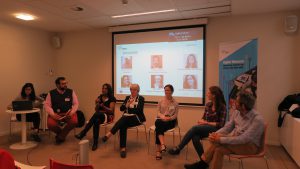
The event started with a plenary session on the “Integration of migrants and refugees through ICT and digital skills” moderated by Altheo Valentini, project manager from Digital Welcome partner organisation Centro Studi Foligno.

The panelists in the session were:
- Achilles Kameas, Professor of Hellenic Open University and WEMIN project coordinator. The project is specifically addressed to migrant women and aims at promoting a close interaction between women of the host and migrant societies
- Camille Hartmann, International Project Manager, Simplon.co and Welcode project manager. The project offers an intensive training in digital professions for refuges, as well as French courses adapted to learners’ needs.
- Julie Adair, Director Digital Collaboration and Ashoka U Change Leader, Glasgow Caledonian University and Common Good First project partner. The project created a digital network to identify, showcase and connect social innovation projects in South Africa to each other and to universities around the world for research, student engagement and learning and teaching. It also used digital storytelling to enhance the inclusion of migrants in Norway and the skills of social innovators.
- Iffat Rose Gill, Founder/CEO of the Code to Change. The Code to Change is aimed at reducing the skills gap and associated gender divide and to empower women to succeed in the ICT job market.
- Gabriela Ruseva, Policy Officer at ALL DIGITAL and Digital Welcome project coordinator.
By presenting their project experience, the panelists stressed how having ICT skills can help migrants in their integration in the hosting society in various contexts and ways – workwise, but also community-wise. During the discussion the public was encouraged to interact by sharing some relevant keywords through a digital tool, mentimeter, which allowed them to feel part of the conversation. Some key words that came out from the conversation were:
- flexibility reflecting the need for programmes targeted to migrants and refugees to be flexible,
- community highlighting the importance of connecting to the host community, and
- employability referring to the fact that one of the main concerns of migrants and refugees is finding a job in order to sustain themselves in the new country.
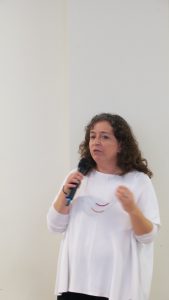
After this first session, it was time to look more specifically at the experience from the Digital Welcome project (after all, this was the final event of the project) which partners were eager to share.
Esther Subias, project coordinator and trainer at Colectic (Spain), Jasper Pollet, trainer at Maks (Belgium), Ilias Rafail from IASIS NGO (Greece) and Maxim, also trainer at Maks (and a Syrian refugee himself), came to the front to talk about the different aspects and stages of the project, and of the training itself.
Partners underlined that the experience of implementing the Digital Welcome training was not easy, because of dropouts, language barrier, changing political situation and other factors. But at the same time, it was extremely rewarding to see how empowering it was for the participants, some of them created digital videos and games for the first time. Inspiring participant stories of empowerment and gratitude were shared by all partners.
This session concluded with remarks from the audience about the need of such trainings for the refugees and migrants, and praises on the commitment and dedication of the trainers. A number of participants expressed interest to adapt the training programme to use with other vulnerable groups.
The event continued in the afternoon with four parallel workshops, each of them corresponding to one of the modules of the Digital Welcome training programme: Digital Storytelling, Digital Journalism, Coding and Soft skills and Employment. These were held by project partners.
The main purpose of the event was to present the project to other training providers and NGOs as a creative ICT programme which has the potential to equip migrants and refugees with important digital skills which can be very useful to integrate in the hosting society. The event was also a valuable occasion to tackle stereotypes, challenge existing narratives on migration, and strengthen the idea of migrants and refugees as a resource for the society.

